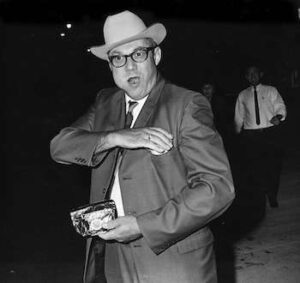
Lawrence Rainey
*Lawrence Rainey was born on this date in 1923. He was a white-American police officer and white supremacist.
Lawrence Andrew Rainey Sr. grew up in Neshoba and Kemper County, Mississippi. His parents were John and Bessie Rainey. Rainey had a younger brother who died at a young age. Rainey's education stopped at the 8th grade. His father was a farmer, and they were likely poor sharecroppers during the Great Depression. He worked as a mechanic before starting a career in law enforcement. He was married to Glady Marie Tolbert, with whom he had two sons, Lawrence Andrew Jr. and John David.
Rainey started his career as a police officer working in Philadelphia, Mississippi. He successfully ran for the office of Sheriff in 1963. On June 21, 1964 afternoon, James Chaney, Andrew Goodman, & Michael Schwerner arrived at Longdale, MS., to inspect the burned-out church in Neshoba County before they were killed. He gained notoriety for his alleged involvement in the June 1964 murders of three civil rights workers.
Rainey was a member of Mississippi's White Knights of the Ku Klux Klan and had previously gone to court for the shooting of an unarmed black motorist in 1959. On January 15, 1965, Rainey and seventeen others learned they were indicted in the murders by having his officers watch the men's position in town. Because there was, at that time, no federal murder statute, they were charged with violation of the three men's civil rights. In 1967, the case went to trial in federal court, and Rainey was acquitted, though six others were convicted. He was charged with violating the victims' civil rights alongside one of his deputies, Cecil Price, but was acquitted in 1967.
Despite his acquittal, Rainey was stigmatized by his role in the events. His law enforcement career ended in 1968 when he was not re-elected as Sheriff of Neshoba County. As a result of the trial, his wife became an alcoholic, and they divorced. She subsequently died of a brain tumor. Rainey later married Juanita and became the stepfather of her three children.
For years after the Freedom Summer murders, Rainey had difficulty finding stable employment; he worked as an auto mechanic and security guard in Kentucky and Mississippi. Rainey later blamed the Federal Bureau of Investigation and the media for preventing him from finding and keeping jobs and reiterated that he was not a racist. He developed throat and tongue cancer and died at his home in Meridian, Mississippi, on November 8, 2002, at 79.